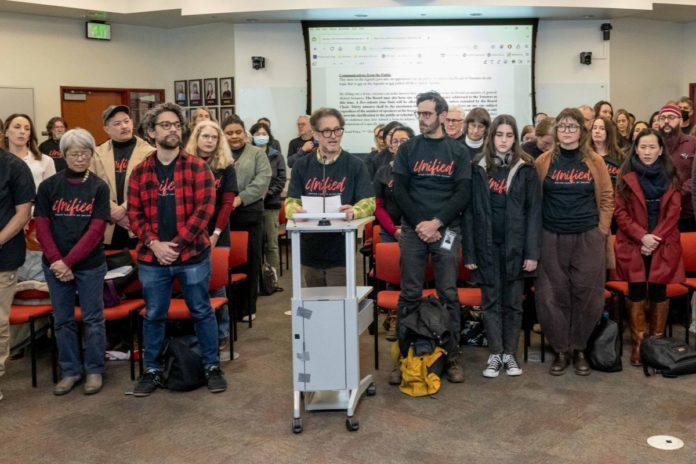At the Feb. 12 meeting of the Ohlone College Board of Trustees, members of United Faculty of Ohlone (UFO) attended en masse to voice their concerns about the college’s management of funds and to pass out a document tracking the college’s financial state over seven years.
Main concerns include three areas: Ohlone will face deficit spending and declining financial reserves in 2025, administrative positions have grown by 26% during a “hold harmless” protection even while full-time faculty positions declined by 8.4% and the board has not complied with its own policies and state regulations.
Per UFO member Heather McCarty, the hold harmless status was intended to allow the college a grace period when it entered the Student Centered Funding Formula (SCFF) era in 2018/2019. Essentially, community colleges received funding from the state based on the number of units taken, and kept receiving the same amount even if enrollment no longer met that baseline—and Ohlone’s doesn’t, due to declining enrollment and an artificially inflated initial estimate.
If Ohlone doesn’t fix their budget to receive funding in line with their true enrollment numbers, in 2025 the state will no longer include COLA (Cost Of Living Adjustment) for faculty. UFO questions why so many administrators were hired while hold harmless provided extra funds.
While Ohlone full-time faculty rank 3rd highest in base salary among the Bay Area 10 community colleges, COLA and other factors such as retirement and medical benefits—plus how many faculty are full time versus part time—make a difference in the salary’s viability.
UFO’s document also questions why interim president Eric Bishop received compensation equivalent to past president Gari Browning, and current president Sasaki compensation exceeding hers, when Browning had built up to her compensation over 12 years.
In addition, the document points to lack of transparency around an Aug. 14, 2024, vote to extend Sasaki’s contract, as well as misreporting of funds to the state chancellor’s office.
In a 2021 memo, Ohlone College planned to hire 10 additional full-time faculty, receiving funding from the state legislature. However, only five full-time positions were listed, and four filled. The funding went into the general fund.
At the meeting, UFO president Jesse MacEwan said that administrator salary was on average the highest in any community college in the state and the president’s salary the highest in the California community college system. Meanwhile, full-time faculty at Ohlone is steadily declining.
He said, “Faculty leaders have been coming to the board for several years to express concerns about our financial predicament. Apparently the urgency of these concerns has not been heard by the board, so I brought a few friends tonight to show that this is not a handful of faculty and instead all of our diverse faculty are unified and share these same concerns.”

Faculty senate president Katherine Michel offered congratulations to Ohlone faculty members who recently made tenure. She also pointed to the number of retirements—two surprise retirements in 2024, two planned for the end of the 2024/2025 school year, and several planned retirements coming up after that.
Michel said, “This means the pattern will remain. Our full-time faculty numbers for 2025/2026 will either remain flat or much more likely will fall yet again…Without full-time faculty, programs do not run effectively. Without full-time faculty, enrollment does not grow at the pace we need it to grow. Deciding to not fill faculty positions when retirements occur is an administrative choice. And this is a choice faculty firmly believe is the wrong one.”
MacEwan urged the board and faculty senate to review the document, and for the board to hold an emergency meeting to develop a plan of action before the Mar. 15 deadline to decide not to renew admin contracts for the coming school year.




